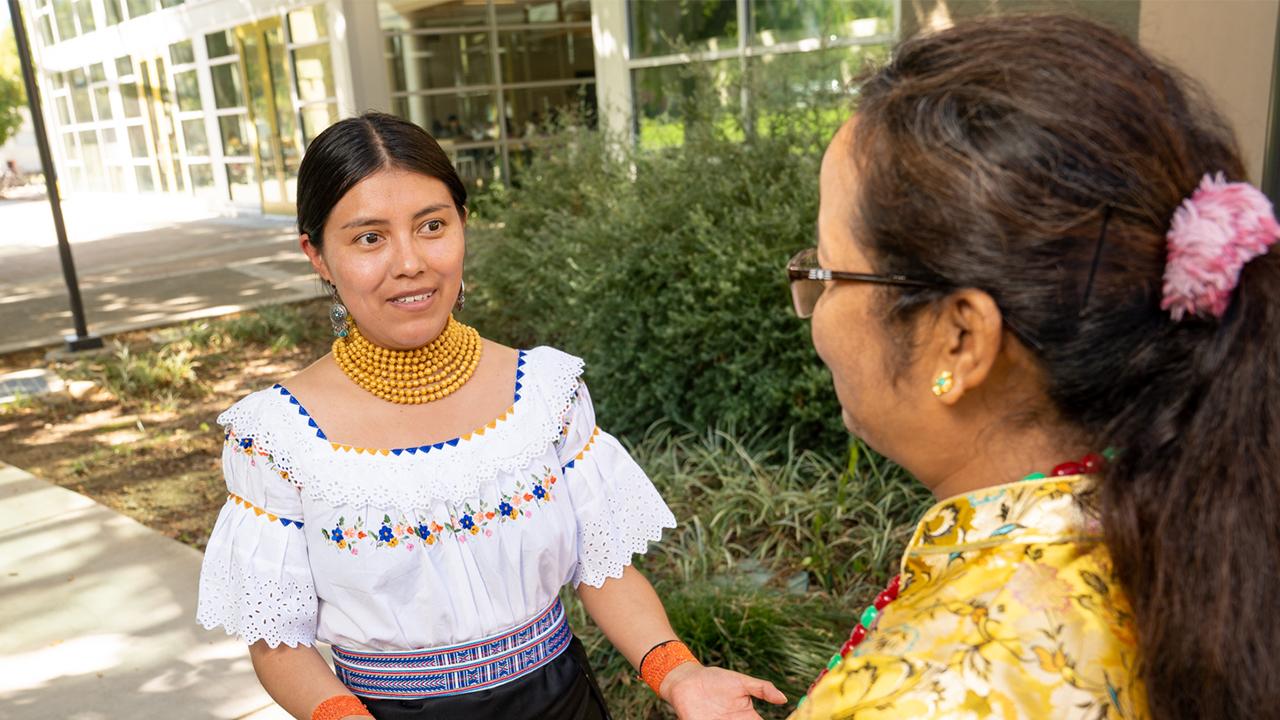
Meet Tamia Quilumbaquí, 2022-23 Hubert H. Humphrey Fellow
Tamia Quilumbaquí
What motivates you?
About Tamia Quilumbaquí
Pronouns: she/her
Country: Ecuador
Occupation: Social worker and human rights advocate
Field: Rural development and human rights
"According to the official statistics, the rural areas in Ecuador face social and economic gaps in terms of poverty. Therefore, focusing efforts on rural development can be a long-term solution to the problems of poverty and with it hunger, employment, social and economic inequalities, among others. Indigenous people live in rural areas mostly. They face unequal opportunities due to discrimination, exclusion and non-recognition of their rights as indigenous people.
"Since I was a child, I have been involved with community life. Although I grew up and lived most of my life in the urban area, it is very close to the rural and indigenous communities. I really appreciate the opportunity to be involved with communities because it continuously offers me opportunities for learning and rethinking what and how I can contribute to the design of initiatives for the full well-being of the communities in my country.
"I belong to the Kichwa Otavalo people in Ecuador. I believe that as a young leader and a woman I can support the work that other leaders are doing in order to reach an intercultural state in Ecuador. I wish that other indigenous children, youths and women would have access to the same or better opportunities that I have had. That is my main motivation.
"Moreover, for the last six years, I have worked with organizations in community projects, international cooperation and human rights. From these workspaces, I was able to learn more in-depth about work strategies and advocacy from a human rights approach."
What drew you to your professional field?
"I have a degree in business administration, however, I started to engage with social projects and more recently with the United Nations work. Then I changed my perspective of what I wanted to do.
"My purpose now is to work with and for those groups that often are marginalized. In my country, rural areas have several challenges in terms of “development.” In my opinion, rurality is not only about agricultural activity. This is an area of other relevant aspects of rurality, such as ways of life, perspectives, participation, education, environment, culture, women, rights and other dimensions we need to pay attention to. For me, the approach of human rights as individuals and collectives is really important in development initiatives."
Why did you apply for the Hubert H. Humphrey Fellowship Program?
"This program is unique due to its approach to leadership development in an integrated way through academic courses, workshops and seminars, practical projects and community involvement. So, this is a great opportunity to improve in-depth my leadership skills in my professional field to contribute to the social and local development processes that my country is currently experiencing. And also on a personal level because of the exchange experience."
What do you hope to take away from this fellowship and apply to your work or at home?
"I hope to take the initiative and support in the design and implementation of development programs raising awareness and promoting the integration and coordination of activities related to indigenous people issues within the Ecuadorian society.
"As a Humphrey fellow, I hope to improve my leadership and communications skills. Also, to establish and build long-term, mutually beneficial relationships with the people I meet in the United States, and learn from their knowledge and best practices that I can implement once I return to Ecuador. Moreover, I would like to do a professional internship in an organization working on indigenous peoples' issues related to social and economic development, culture, environment, education, and human rights. This would allow me to gain abilities to deal with the challenges faced by indigenous people from my country."
What is something from your country that you would like to share with the UC Davis community?
"This is my first time in the United States and for me is a unique opportunity for exchange not only because I am learning about American culture and traditions, but at the same time I can share the culture and traditions of Ecuador. Ecuador is a small country in South America and a megadiverse due to its location with natural geographical zones, such as the coast, highlands, the Amazon and the Galápagos Islands. Ecuador also has a diversity of cultures and people. There is a diversity of indigenous people. I would like to share about the indigenous people and nationalities from my country, especially the Kichwa Otavalo people."
How would you like to engage with UC Davis and the community here?
"At the UC Davis campus, I would like to engage in academic and professional activities related to sustainable development, gender studies and cultural issues. I want to learn and participate in their projects. During my Humphrey year, also I would like to participate as a volunteer in a social initiative in Davis and learn about the culture of the Davis community."